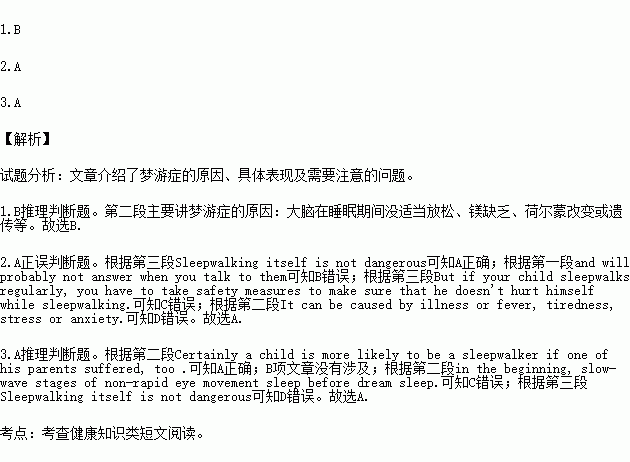题目内容
Sleepwalking is a sleep disorder. Your child will rise from bed and walk or engage in other activities that they would normally do when they are awake. Their eyes will be open but they will appear to be in a dream-like state, and will probably not answer when you talk to them, although they may carry out conversations. Sleepwalking can last a few seconds , a few minutes, or more.
Sleepwalking can be an indication that certain parts of the brain may not be relaxing properly at bedtime. It can be caused by illness or fever, tiredness, stress or anxiety. It is thought to occur in the beginning, slow-wave stages of non-rapid eye movement sleep before dream sleep. It may be related to the lack of magnesium (镁) , and it is very possible that hormonal(荷尔蒙的)changes in body could cause it. Certainly a child is more likely to be a sleepwalker if one of his parents suffered, too .
Sleepwalking itself is not dangerous and is generally not a sign of any more worrying problems. But if your child sleepwalks regularly, you have to take safety measures to make sure that he doesn't hurt himself while sleepwalking. Makes sure that any doors can't be opened by a child, and lock doors to the cellar, kitchen and other dangerous places. Check each night before lights go out for sharp objects or, indeed , anything on the floor which your child could trip over or hurt himself on.
A child may sleepwalk once and never sleepwalk again. Others may sleepwalk once a month or so. Still others may sleepwalk almost nightly. If you are worried you should consult your doctor.
1. What does the second paragraph mainly tell us?
A. The concept of sleepwalking.
B. The causes of sleepwalking.
C. Some ways to help sleepwalking.
D. The behaviors during sleepwalking.
2.Which of the following is true according to the passage?
A. Sleepwalking itself is not dangerous.
B. Children who sleepwalk may answer when you talk to them.
C. If your child sleepwalks regularly, you can just leave him alone.
D. Sleepwalking is related to the lack of sleep.
3.It can be inferred from the passage that____.
A. sleepwalking may be passed down in a family
B. drugs that could cure sleepwalking have been developed
C. during a normal sleep, a person never opens his eyes
D. most doctors consider sleepwalking as a serious problem
 阅读快车系列答案
阅读快车系列答案书面表达
现在,青少年肥胖现象越来越严重,很让父母担心。请你就这一现象,根据下面提示写一篇100字左右英语报道。
原因 | 1. 缺少运动 2. 饮食结构不合理 |
建议 | 1. 多参加体育锻炼 2. 多吃健康食品,远离垃圾食品 3. … |
参考词汇:肥胖:obesity 垃圾食品:junk food
要求:1. 对所有要点要适当发挥,不要简单翻译。2 开头已给出,不计入总数
Recently, the phenomenon of teen obesity has made a lot of parents concerned. ________
书面表达
假定你是李华,看到班上有部分同学在做作业时,不自己独立完成而是抄袭他人的作业,针对这种现象,请你以My Opinion on Copying Others' Homework为题谈谈你自己的看法。
注意:1.短文必须包括下面表格中的所有内容要点,可适当发挥。
2.短文标题与开头已为你写好,不计入总词数。
3.词数120左右。
主要原因 | 作业量大,偏难 |
对功课不感兴趣,懒隋 | |
完成任务,取悦老师 | |
危害及解决办法 | 抄袭不对,违反校规 |
要诚实,勤奋学习 | |
有困难可请教同学和老师 | |
个人看法 | …… |
My Opinion on Copying Others' Homework
It is known to us all that some students copy others' homework ................................................
______________________________________________________________________
______________________________________________________________________
______________________________________________________________________
______________________________________________________________________
______________________________________________________________________
______________________________________________________________________

